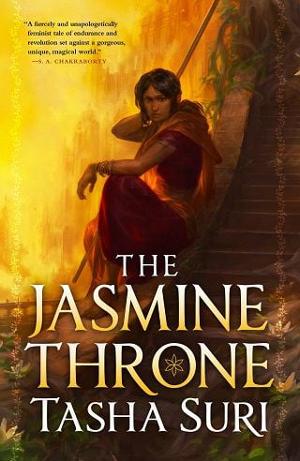Chapter 65: Rao
RAO
If the rain came, the plan would fail.
As it was, the waters in the tunnel beneath the lacquer gardens were swollen, a reservoir that rose to the chests of the men who lowered themselves down first into the dark. For all that Malini was a tall woman, Rao feared she would not be able to stand in it.
But she lowered herself down anyway. It touched her chin.
The warriors who led the way held their wrapped weapons above them, covered in sacking to protect them from water damage. The water was fetid and stank, and Rao had to resist the urge to gag.
Be thankful, he told himself, that it has not recently rained. Be thankful we’re not drowning here.
Be thankful there’s a way out at all.
He steeled himself, moving forward in the dark.
They had left men and women in the lacquer gardens. They’d had to. “If there are soldiers coming here, they’ll see clear as day if the place is empty,” the Dwarali lord had said. “So I’ll leave a boy or two, and I’ll ask the rest of you fine men to do the same.”
The other princes and lords had agreed, and done so. And Rao had not looked at Malini. He hadn’t needed to. He knew how carefully she spun her webs. Her silence, when the men spoke, meant nothing at all.
The priests of the nameless had elected to remain. “This is our place, and the site of our service and duty,” one man had said, tranquil as he kneeled in a copse of lacquer trees, beneath the pearly sheen of their leaves and the slick, shimmering oil of their bark. “The nameless will decide what becomes of us.”
“Likely nothing will come of this,” Mahesh, a Parijati lord who’d been thoroughly loyal to Aditya from the start, had responded gruffly. “But we thank you for your bravery.”
“It isn’t bravery,” Aditya had murmured to Rao later, as the men packed their gear and their weapons—as Malini watched from beneath the shade of the monastery’s veranda, her pallu drawn over her face. “It’s merely our calling. Acceptance of the winds of fate.”
“I think acceptance of your fate can be brave,” Rao had said in response, thinking of Alori. “To face your death calmly… it can be brave.”
Aditya must have thought of her then, too. He looked suddenly stricken.
“Rao, I didn’t mean—”
“It’s nothing,” Rao had cut in. And it was nothing. It had to be nothing. But he could not have borne Aditya’s apologies. “We’d best prepare to go.”
Now they moved farther and farther through the tunnels of water, great stone-lined hollows, with the darkness growing steadily thicker, closing in upon them. No lanterns. No fire. There could not be fire here. Not yet, and hopefully not ever. He looked back once more at Malini. She was almost invisible, but he could see her eyes, the whites of them a gleam against water.
“Prince Rao,” one of Prem’s men said in a low voice. “We’re nearing the end.”
A grate above them. Thin segments of moonlight. Three men reached up to heave the thing aside. Rao only had a moment to fear ambush—a canny strategist with a mere handful of men could pick them off one by one here—but they managed to worm their way through the grate without issue. When Malini was dragged out of the water, Aditya immediately wrapped her in the sacking that had been removed from one of the weapons. Malini whispered her thanks, clinching the wrapping around her as if it were the finest Dwarali shawl.
They moved quietly into the cover of trees—fresh, unlacquered, sweet with the scent of sap and soil. No lights between them, as bows were strung, their weight tested. Behind the cover of trees lay the great reservoir dam of Srugna, held back by a cunning artifice of stone the likes of which Rao had never seen before. He would have liked to admire it, to study it, once. Not today.
Malini came to stand near him. She was shivering faintly, but her eyes were sharp, fixed on the monastery below them.
“All’s quiet,” said Malini.
“Did your Dwarali lord tell you so?”
“Lord Khalil did, yes,” said Malini. “And he is not mine, Rao. Don’t be petty. His first loyalty is to his emperor.”
“His first loyalty is to Dwarali’s interests.”
“Lucky, then, that Aditya’s interests and Dwarali’s align.” Her voice, her expression, were impassive. “I have the impression you’re angry at me, Rao.”
He was silent for a moment. Then he said, “This plan.”
“Yes?”
“It’s foolish. I don’t know how you convinced Aditya to support it, but I fear it.”
Malini did not even pretend it had not been her plan. “I didn’t convince him of anything. I merely made a suggestion. And Emperor Aditya gave it due consideration.”
“Due consideration,” Rao repeated. “What did you say to him?”
“The truth,” Malini said simply.
“This plan is…” He hesitated.
“Say it, Rao.”
“Cold,” he said. “Cruel. Unlike you.”
“You sound a little like Aditya did,” she said, after a pause that stretched the air between them thin. “But I suppose you’ve long been friends for a reason. You both have a weakness in you that I don’t understand.”
“Morality isn’t weakness.”
“It is if it will see us all dead. Rao, we have men, but only so many men, and so many weapons,” said Malini. “The monastery is in a valley. Vulnerable, for all that it has only one known entrance. All that, you know. If we remained there, we would be rounded up with ease. Or slaughtered. Perhaps they would burn us. It would be so easy.” Her voice shifted, like fingers upon a sitar’s strings, from softness to thrumming savagery. “And I will not burn, Rao.”
“Malini.”
“What? What will you have of me? If Lord Khalil or Mahesh or Narayan had come up with the idea, you would not react so. If Aditya had done it, you would have obeyed with a heavy heart, but you would not have talked to him as you do to me. Why is that?”
“You believe I think less of you than I do of these men,” Rao said, incredulous.
She gave him a look that held nothing in it. Not even judgment. “I don’t know what you see when you look at me. But if you think it is too cold for me, or too cruel…” She shrugged. “I have never lied to you, Rao. If you don’t know me, if you fail to understand what I want to achieve, you alone are responsible for that.”
Rao held his tongue at that.
Perhaps this was the moment. Perhaps it was time for him to tell her the truth. The secret of his name, wrapped like a dark gift, waiting to be spoken. He had always believed he would know when the time was right—had always been told he would know when the name needed to be uttered. But he didn’t feel that weight of rightness in his bones now. Only the creeping damp of his stinking wet clothes, and the eerie stillness of the air, as warriors crouched around him in the darkness.
He almost said it anyway. Almost turned to Malini, shaping his mouth around the words. My name, the name the priests whispered in my ear at birth. Malini, my name is—
“They’re here.” A murmur, passed from warrior to warrior, reached the place where Malini and Rao stood. Rao’s body went numb.
Below them, snaking through the one pass that allowed direct entry into the lacquer gardens, was a procession of warriors. Not Chandra’s full forces by any means, no, but Parijati royal warriors all the same. They were moving silently, swiftly, but Rao recognized them regardless. There was something about the way they moved. And of course, those weapons, great gleaming sabers, the glint of a sharp-edged discus at another man’s belt.
A retinue sent to kill a man in his bed. They did not know, he suspected, that Aditya had any followers congregating in his service. If they had, they would not have come in such small numbers. They would have brought greater weapons of war.
Nonetheless, if Aditya’s followers had not left the lacquer gardens as the scout had warned them to; if they had remained and followed the way of the priesthood, allowing the tide of fate to wash over them…
Rao looked at Malini. She did not look back.
Kneeling at their feet, the warrior who’d spoken was making slow, deliberate motions: reaching for his flint, for the arrow, for the basic preparation of oil and ghee that had been hastily bottled before their descent. The others were doing the same. In the tense silence, Aditya made his way free from the crowd. He had a bow in his hands, and a quiver of arrows at his back.
It was a relief to see him stand forward so, with his shoulders straight and his head raised, his eyes narrowed as he stared through the night gloom at the monastery below them.
He held his hand up, making an unmistakable gesture. Hold fast.
They waited. Below there were cries, and the clash of swords. As planned, the few soldiers who remained below turned on Chandra’s men. It was a lure. Let the warriors of Parijat think they had come upon the monastery unaware. Let them think they would overcome Aditya, and send him to his slaughter.
Let them flood deeper into the lacquer gardens.
Aditya’s hand remained up. Hold fast. And Rao, who held no bow, held nothing fast but his breath inside his throat. Even his heart was frozen inside him, waiting for the inevitable cue.
Light the arrows. Set the monastery ablaze. Ensure that all of Chandra’s men—and all the poor, priestly sacrifices who’d remained behind—burned.
Hold fast.
He waited. Aditya did not lower his hand.
There was a rustle of unease. The noise below was growing fiercer.
Any moment, they were going to be spotted. The Parijati warriors would see them and turn their weapons upward, catching their men with arrows through the throat, the belly. The Parijati had the disadvantage, low in the valley as they were, but Rao still came out in a cold sweat at the thought.
One of the lords muttered an oath, moving as if to lower Aditya’s hand for him, to make the motion that commanded death—but Aditya said, in a voice like the coldest rain, “Would you burn priests? Hold, brother.”
The lord flinched. Stopped.
Aditya was imposing, in profile. Gaze like ice, his jaw a sharp line, austere and remote. He looked more like himself—like the Aditya Rao had grown up alongside, a prince of Parijat, a man who had never been anything but unfailingly honest, a scrupulous follower of honor and the noble code—than he had since the night he had heard the nameless speak.
Rao knew Aditya, this Aditya, well enough, to know what would come next. They were well placed here, to race down the valley, to slaughter warriors aplenty. It would be a purer path than the one planned. It would result in the deaths of many of their own men whom they could ill afford to lose. And yet the thought of it was a relief. It was a noble kind of war, and Aditya was a noble kind of emperor-in-waiting.
Rao was already reaching for his sword when Malini stepped forward. She had dropped the sacking and stood in nothing but her damp sari, her braid a black snake coiled at her throat. She strode forward as ugly cries intensified below them—the bellows of men murdering and men dying. Aditya went utterly still. Whatever he saw in his sister’s face held him fast.
“No man wants to kill his kin,” Malini said gently. “I understand that.”
She took Aditya’s bow from him. It was overlarge for her, but she held it steady.
“The priests of the nameless believe in fate,” she said, in clear common Zaban—loud enough for their men to hear her. Loud enough, Rao feared, for the men below to hear her too. But she did not flinch, and she did not protect herself. She stood tall. “The priests of the nameless built their garden of lac and resin. They knew this day would come to pass. Is that not so, Prince Rao? Do your priests know the path of fate?”
“They do,” he heard himself say, and knew he had condemned them.
“You will, perhaps, not wish to listen to the entreaties of a mere woman,” she said, in a voice that was even and calm and had no humility in it at all. “But I am a daughter of Parijatdvipa’s oldest line. A princess of Parijat. I am descended from the first mother of flame. My brother, the false emperor, tried to burn me alive, but I lived. I know the judgment of fire, and the price it demands. And here, in this dark, I hear the mothers. And I know it is my duty to ensure that fate is done.” She sucked in a deep breath, as if fortifying herself, as if she carried a burden of unfathomable weight—and turned and looked at the kneeling warrior, who stared up at her, silent and rapt. “Light my arrow,” she said.
He dipped an arrow in ghee. Held up his flint. Lit a spark.
The priests of the nameless built their garden of lac and resin. They knew this day would come to pass.
Rao watched the burning point of flame as Malini raised and nocked the arrow with a face like stone. He thought of the priests who’d remained behind and their own calm eyes. He thought of the way fate moved like a winding noose, a thing of silk, waiting until the time came to tighten its grip.
They knew this day would come to pass. It felt right. Ah, damn her, it felt true.
Behind her—around her—a dozen new points of flame appeared. A dozen more. Arrows were drawn. Spears held high.
Malini released her arrow, and the fire followed the arc of her loosed flame.
For a moment there was nothing more than the tips of those burning arrows in the dark, small motes lighting like falling stars.
And then the lacquer garden began to burn.
Through the crackle of the flames, Rao heard screams. Malini stood, for a brief moment, limned in light, the bow still in her hands. The smoke rose up behind her, a great cloud of it, curling gray into the night, its edges faded gold. He swallowed, staring at her and staring at her, until the smoke and the fire made his eyes tear and burn. Such was the way of fate.
He should have known this day would come to pass, too.
 Fullepub
Fullepub 



